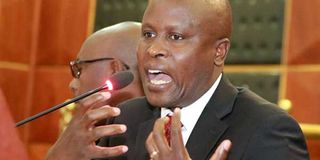Sugar probe report was not doctored, says Kanini Kega

Kieni MP Kanini Kega who is the chairman of the Parliamentary Committee on Trade, Industry and Cooperatives. He has defended the team’s report on contraband sugar, denying claims that it was doctored. PHOTO | JEFF ANGOTE | NATION MEDIA GROUP
What you need to know:
- The Kieni MP defended his team saying the controversy emerged over contradictory wording in a section of the report.
- The controversial amended sections recommended that the three State officials take personal responsibility for the sugar scam.
- Mr Kega said that the amendments in the contentious sections had been made as per standing orders.
The chairman of the Parliamentary Committee on Trade, Industry and Cooperatives Kanini Kega has defended the team’s report on contraband sugar, denying claims that it was doctored.
The Kieni MP, who chaired the joint parliamentary committee investigating the presence of contraband sugar in the country, defended his team saying the controversy emerged over contradictory wording in a section of the report.
Speaking during a press conference in Nyeri Friday, Mr Kega said the controversy emerged as a result of literal semantics in the report’s wording.
He blamed lawyers who drafted the report for the wording error saying it had been amended.
SEMANTIC ERROR
“I am confident and proud of the committee’s work on the report. I emphasise that the report was not doctored. There was a semantic error in the wording from the lawyers who drafted it,” Mr Kega said.
Dagoretti North MP Simba Arati and Makueni's Dan Maanzo had earlier claimed the report, which implicated Cabinet secretaries Henry Rotich (Treasury), Adan Mohammed (EAC and formerly of Trade) and former Agriculture CS Willy Bett, was edited.
TAKE RESPONSIBILITY
The amended sections that caused controversy recommended that the three State officials take personal responsibility for the sugar scam.
Mr Rotich, as per the recommendations, will be held responsible for allowing excess importation of sugar resulting in tax evasion.
From the committee’s findings, about five percent of the sugar was smuggled into Kenya through Kismayu in Somalia while over 90 percent came in via the main ports.
Mr Bett will held responsible for recommending waivers for about 14 companies.
On his part, Mohamed, who formerly held the Trade docket, will be answerable for complacency by the Kenya Bureau of Standards (KEBS) in inspecting the sugar that was imported.
COMMITTEE SATISFIED
Mr Kega said that the amendments in the contentious sections had been made as per standing orders and that the entire committee was satisfied with the changes and contents of the report.
In the report, the committee has at the same time maintained that the sugar on the shelves is safe for consumption and that there is no proof of toxic metals in it.
The Kieni MP pointed accused the Government Chemist of giving unproven information and wants the State agency investigated.
Mr Kega said that even though the Government Chemist through the Ministry of Health reported that the sugar had copper and mercury traces, they had not proved the claims which he termed as “inconclusive and unproven”.
GOVERNMENT CHEMIST
“This information came from Government Chemist and when we summoned them to substantiate and explain the claims, the declined to show up. In fact we have recommended that they too be investigated and bear responsibility over the sugar [issue],” Mr Kega explained.
The report on the presence of toxic metals was apparently arrived at based on tests on sugar samples from Bungoma and Nairobi.
But the committee says some of the sugar that is still being held had high moisture content as a result of transportation and storage.
“Some of the sugar came unpacked just like the way sand is transported. The process from the port to the shelves led to the moisture content contamination,” he said.
The report also suggests that several businesspeople who imported sugar be held to account.




